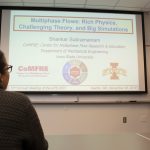Even though the Cyclones and Hawkeyes often duke it out on the field, court and mat, researchers from the two universities have come together to collaborate on a Department of Defense-funded project. The project, titled “3D-Printed, Hierarchical Polymer-Bonded Energetic Composites with Electromagnetically Switchable Porosity,” is being led by principal investigator (PI) Xuan “Sean” Song, assistant …Continue reading “Iowa State U, U of Iowa team up on energetic materials research project”
Iowa State and University of Texas engineers have developed high-fidelity computational models of replacement heart valves to examine the performance of biological tissues built into the valves. They found that thinner tissues can flap and flutter, which can damage the valves and even the blood that flows by.
Researchers led by Nicole Hashemi, an associate professor of mechanical engineering, are using their expertise with the manufacture of microstructures to study how the collapse of microbubbles within the skull can damage brain cells. Their research, which is supported by the Office of Naval Research, could lead to the design of better helmets.
Alberto Passalacqua, associate professor of mechanical engineering and associate director of the Center for Multiphase Flow Research and Education (CoMFRE), is leading the development of the software OpenQBMM at Iowa State. OpenQBMM is an open-source multiphase flow computational fluid dynamics (CFD) software designed to simulate the behavior of flows with particles, bubbles, or droplets. …Continue reading “OpenQBMM software simulates multiphase flow behavior”
ME/ChE 632: Multiphase Flow gives students unique hands-on education and experience in multiphase flows, backed by the exceptional expertise of Iowa State’s Center for Multiphase Flow and Research Education’s (CoMFRE) faculty members.
While bringing together faculty and students through research endeavors, CoMFRE has capitalized on its working relationships with industry partners.
The Center for Multiphase Flow Research and Education (CoMFRE) has undergone notable developments over the course of the past year. CoMFRE became an official center in fall 2017, and it continues to grow as collaboration flourishes and research advances.
Iowa State University is part of an inter-university research project examining the intricacies of sprays. Ted Heindel, Bergles Professor of Thermal Science and university professor in mechanical engineering, is the lead researcher at the Iowa State site. Within Heindel’s Experimental Multiphase Flow Lab, the researchers are using X-rays and high-speed imaging to experimentally study the …Continue reading “Using X-rays and high-speed imaging to examine sprays”
Jonghyun Lee, assistant professor of mechanical engineering and CoMFRE faculty member, is leading a multiyear, $750,000 project titled Modeling and Simulations of Electrostatically Levitated Multiphase Liquid Drops.
Alex Wrede, a postdoctoral researcher with Hashemi Laboratory, is using engineering to unravel the mystery of traumatic brain injuries – and winning awards for how he tells the story of the impact of his work.
The 2019 CoMFRE Symposium and Member Meeting was held Oct. 28–29 in Ames. Industry members met in a closed meeting on Monday afternoon to receive updates on shared research and meet with CoMFRE faculty and students to discuss future research and goals for the center.
Pelin Guven Geredeli, assistant professor in mathematics, is bringing new ideas to the Center for Multiphase Flow Research and Education with an enthusiasm to engage in cross-disciplinary collaboration.
We put a lot of things in a kitchen microwave, from Hot Pockets to leftover lasagna. But what about rocket propellant?
That’s essentially what Travis Sippel and his team are doing in a Young Investigator Project (YIP) with the Air Force Office of Scientific Research. More specifically (and more safely), they are testing methods to dynamically control the combustion of a solid rocket propellant by applying microwave energy.
“We’ve been collaborating informally, just motivated by the science questions, without any funding for a year or so. As we were working out those science questions, we thought, ‘Hey, we should really move this forward,’” said Shankar Subramaniam, professor of mechanical engineering. Subramaniam and collaborators from Minnesota and Michigan recently received funding for a three-year …Continue reading “The intersection of research and education: New NSF award for Subramaniam”
